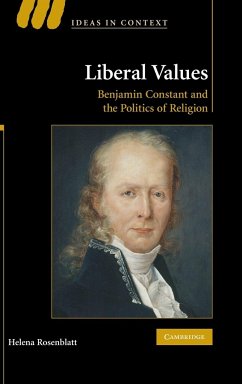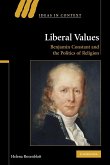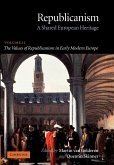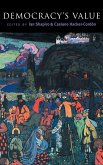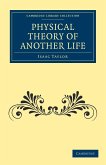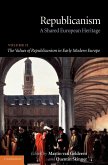Helena Rosenblatt
Liberal Values
Helena Rosenblatt
Liberal Values
- Gebundenes Buch
- Merkliste
- Auf die Merkliste
- Bewerten Bewerten
- Teilen
- Produkt teilen
- Produkterinnerung
- Produkterinnerung
Constant's intellectual development into a founding father of modern liberalism is examined through an analysis of his evolving religious philosophy.
Andere Kunden interessierten sich auch für
![Liberal Values Liberal Values]() Helena RosenblattLiberal Values60,99 €
Helena RosenblattLiberal Values60,99 €![Contemporary Islam Contemporary Islam]() Mohammed Abu-Nimer / Meena Sharify-Funk (eds.)Contemporary Islam200,99 €
Mohammed Abu-Nimer / Meena Sharify-Funk (eds.)Contemporary Islam200,99 €![Solar Energy, Technology Policy, and Institutional Values Solar Energy, Technology Policy, and Institutional Values]() Frank N. LairdSolar Energy, Technology Policy, and Institutional Values104,99 €
Frank N. LairdSolar Energy, Technology Policy, and Institutional Values104,99 €![The Values of Republicanism in Early Modern Europe The Values of Republicanism in Early Modern Europe]() Martin van Gelderen / Quentin Skinner (eds.)The Values of Republicanism in Early Modern Europe52,99 €
Martin van Gelderen / Quentin Skinner (eds.)The Values of Republicanism in Early Modern Europe52,99 €![Democracy's Values Democracy's Values]() Ian Shapiro / Casiano Hacker-Cordsn (eds.)Democracy's Values118,99 €
Ian Shapiro / Casiano Hacker-Cordsn (eds.)Democracy's Values118,99 €![Physical Theory of Another Life Physical Theory of Another Life]() Isaac TaylorPhysical Theory of Another Life41,99 €
Isaac TaylorPhysical Theory of Another Life41,99 €![The Values of Republicanism in Early Modern Europe The Values of Republicanism in Early Modern Europe]() Martin van van Gelderen (eds.) / Quentin Skinner (eds.)The Values of Republicanism in Early Modern Europe101,99 €
Martin van van Gelderen (eds.) / Quentin Skinner (eds.)The Values of Republicanism in Early Modern Europe101,99 €-
-
-
Constant's intellectual development into a founding father of modern liberalism is examined through an analysis of his evolving religious philosophy.
Hinweis: Dieser Artikel kann nur an eine deutsche Lieferadresse ausgeliefert werden.
Hinweis: Dieser Artikel kann nur an eine deutsche Lieferadresse ausgeliefert werden.
Produktdetails
- Produktdetails
- Verlag: Cambridge University Press
- Seitenzahl: 300
- Erscheinungstermin: 29. April 2016
- Englisch
- Abmessung: 235mm x 157mm x 21mm
- Gewicht: 588g
- ISBN-13: 9780521898256
- ISBN-10: 0521898250
- Artikelnr.: 24927211
- Herstellerkennzeichnung
- Libri GmbH
- Europaallee 1
- 36244 Bad Hersfeld
- gpsr@libri.de
- Verlag: Cambridge University Press
- Seitenzahl: 300
- Erscheinungstermin: 29. April 2016
- Englisch
- Abmessung: 235mm x 157mm x 21mm
- Gewicht: 588g
- ISBN-13: 9780521898256
- ISBN-10: 0521898250
- Artikelnr.: 24927211
- Herstellerkennzeichnung
- Libri GmbH
- Europaallee 1
- 36244 Bad Hersfeld
- gpsr@libri.de
Acknowledgments
Abbreviations
Introduction
Part I. Constant's Education: the French, Scottish, and German Enlightenments: 1. Childhood
2. Edinburgh
3. Paris
4. Protestantism and the Enlightenment
5. Brunswick
6. Mauvillon, the new German theology and the idea of progressive revelation
7. Constant's 'The Spirit of Religions'
8. Madame de Staël
Part II. The Crucible of the Directory Years: 1. The see-saw policy of the directory
2. Catholicism and the need for 'Republican Institutions'
3. Catholic counter-arguments
4. Constant during the Directory
5. Critics of the Directory's Religious Policies
6. The second Directory and the renewed campaign for Republican institutions
7. Theophilanthropy
8. Lessons of the Directory: William Godwin and Des circonstances actuelles
Part III. Napoleon, or Battling 'the New Cyrus': 1. Napoleon and the Catholic Revival
2. Enlightened responses and the plan to 'Protestantize' France
3. Charles de Villers
4. Bonaparte's decision
5. Portalis on the Utility of Religion
6. The Concordat and the Organic Articles
7. Friends and foes of the Concordat: from the Génie du christianisme to Delphine
8. Constant's trip to Germany
9. The Sentiment/Form Distinction
10. Return to Paris (December 1804) and the Debate on a National Religion
Part IV. Constant becomes Constant: From the Principles of Politics (1806) to the Spirit of Conquest and Usurpation (1814): 1. Constant's Political Principles in 1806
2. 'Private judgement' in Protestant Polemics
3. Book VIII: On Religious Freedom
4. Constant's 'Corner of Religion': from the 'Letter about Julie' to the Correspondence with Prosper de Barante, a. The 'Letter about Julie', b. Adolphe and Cecile, c. Correspondence with Prosper de Barante
5. De l'Allemagne (1810)
6. Constant's return to Germany
7. The spirit of conquest and usurpation (1814)
Part V. Politics and Religion during the Restoration (1814-24): 1. Keeping Political Liberty Alive
2. Keeping Religious Liberty Alive
Part VI. The 'Protestant Bossuet': De la religion in Political Context (1824-30): 1. De la religion, volume I (May 1824), Reviews of volume I
2. Charles X and 'the invasion of priests', Constant's article 'Christianity', Professions of Protestantism
3. De la religion, volume II (October 1825)
4. The Problem with Industrie: Constant and religion seen from the Left
1. Saint-Simon's 'New Christianity' (1825)
2. Auguste Comte, Le Producteur, and the search for a new 'spiritual authority'
Part VII. Constant's Legacy: 1. The Revolution of 1830
2. Constant's declining reputation.
Abbreviations
Introduction
Part I. Constant's Education: the French, Scottish, and German Enlightenments: 1. Childhood
2. Edinburgh
3. Paris
4. Protestantism and the Enlightenment
5. Brunswick
6. Mauvillon, the new German theology and the idea of progressive revelation
7. Constant's 'The Spirit of Religions'
8. Madame de Staël
Part II. The Crucible of the Directory Years: 1. The see-saw policy of the directory
2. Catholicism and the need for 'Republican Institutions'
3. Catholic counter-arguments
4. Constant during the Directory
5. Critics of the Directory's Religious Policies
6. The second Directory and the renewed campaign for Republican institutions
7. Theophilanthropy
8. Lessons of the Directory: William Godwin and Des circonstances actuelles
Part III. Napoleon, or Battling 'the New Cyrus': 1. Napoleon and the Catholic Revival
2. Enlightened responses and the plan to 'Protestantize' France
3. Charles de Villers
4. Bonaparte's decision
5. Portalis on the Utility of Religion
6. The Concordat and the Organic Articles
7. Friends and foes of the Concordat: from the Génie du christianisme to Delphine
8. Constant's trip to Germany
9. The Sentiment/Form Distinction
10. Return to Paris (December 1804) and the Debate on a National Religion
Part IV. Constant becomes Constant: From the Principles of Politics (1806) to the Spirit of Conquest and Usurpation (1814): 1. Constant's Political Principles in 1806
2. 'Private judgement' in Protestant Polemics
3. Book VIII: On Religious Freedom
4. Constant's 'Corner of Religion': from the 'Letter about Julie' to the Correspondence with Prosper de Barante, a. The 'Letter about Julie', b. Adolphe and Cecile, c. Correspondence with Prosper de Barante
5. De l'Allemagne (1810)
6. Constant's return to Germany
7. The spirit of conquest and usurpation (1814)
Part V. Politics and Religion during the Restoration (1814-24): 1. Keeping Political Liberty Alive
2. Keeping Religious Liberty Alive
Part VI. The 'Protestant Bossuet': De la religion in Political Context (1824-30): 1. De la religion, volume I (May 1824), Reviews of volume I
2. Charles X and 'the invasion of priests', Constant's article 'Christianity', Professions of Protestantism
3. De la religion, volume II (October 1825)
4. The Problem with Industrie: Constant and religion seen from the Left
1. Saint-Simon's 'New Christianity' (1825)
2. Auguste Comte, Le Producteur, and the search for a new 'spiritual authority'
Part VII. Constant's Legacy: 1. The Revolution of 1830
2. Constant's declining reputation.
Acknowledgments
Abbreviations
Introduction
Part I. Constant's Education: the French, Scottish, and German Enlightenments: 1. Childhood
2. Edinburgh
3. Paris
4. Protestantism and the Enlightenment
5. Brunswick
6. Mauvillon, the new German theology and the idea of progressive revelation
7. Constant's 'The Spirit of Religions'
8. Madame de Staël
Part II. The Crucible of the Directory Years: 1. The see-saw policy of the directory
2. Catholicism and the need for 'Republican Institutions'
3. Catholic counter-arguments
4. Constant during the Directory
5. Critics of the Directory's Religious Policies
6. The second Directory and the renewed campaign for Republican institutions
7. Theophilanthropy
8. Lessons of the Directory: William Godwin and Des circonstances actuelles
Part III. Napoleon, or Battling 'the New Cyrus': 1. Napoleon and the Catholic Revival
2. Enlightened responses and the plan to 'Protestantize' France
3. Charles de Villers
4. Bonaparte's decision
5. Portalis on the Utility of Religion
6. The Concordat and the Organic Articles
7. Friends and foes of the Concordat: from the Génie du christianisme to Delphine
8. Constant's trip to Germany
9. The Sentiment/Form Distinction
10. Return to Paris (December 1804) and the Debate on a National Religion
Part IV. Constant becomes Constant: From the Principles of Politics (1806) to the Spirit of Conquest and Usurpation (1814): 1. Constant's Political Principles in 1806
2. 'Private judgement' in Protestant Polemics
3. Book VIII: On Religious Freedom
4. Constant's 'Corner of Religion': from the 'Letter about Julie' to the Correspondence with Prosper de Barante, a. The 'Letter about Julie', b. Adolphe and Cecile, c. Correspondence with Prosper de Barante
5. De l'Allemagne (1810)
6. Constant's return to Germany
7. The spirit of conquest and usurpation (1814)
Part V. Politics and Religion during the Restoration (1814-24): 1. Keeping Political Liberty Alive
2. Keeping Religious Liberty Alive
Part VI. The 'Protestant Bossuet': De la religion in Political Context (1824-30): 1. De la religion, volume I (May 1824), Reviews of volume I
2. Charles X and 'the invasion of priests', Constant's article 'Christianity', Professions of Protestantism
3. De la religion, volume II (October 1825)
4. The Problem with Industrie: Constant and religion seen from the Left
1. Saint-Simon's 'New Christianity' (1825)
2. Auguste Comte, Le Producteur, and the search for a new 'spiritual authority'
Part VII. Constant's Legacy: 1. The Revolution of 1830
2. Constant's declining reputation.
Abbreviations
Introduction
Part I. Constant's Education: the French, Scottish, and German Enlightenments: 1. Childhood
2. Edinburgh
3. Paris
4. Protestantism and the Enlightenment
5. Brunswick
6. Mauvillon, the new German theology and the idea of progressive revelation
7. Constant's 'The Spirit of Religions'
8. Madame de Staël
Part II. The Crucible of the Directory Years: 1. The see-saw policy of the directory
2. Catholicism and the need for 'Republican Institutions'
3. Catholic counter-arguments
4. Constant during the Directory
5. Critics of the Directory's Religious Policies
6. The second Directory and the renewed campaign for Republican institutions
7. Theophilanthropy
8. Lessons of the Directory: William Godwin and Des circonstances actuelles
Part III. Napoleon, or Battling 'the New Cyrus': 1. Napoleon and the Catholic Revival
2. Enlightened responses and the plan to 'Protestantize' France
3. Charles de Villers
4. Bonaparte's decision
5. Portalis on the Utility of Religion
6. The Concordat and the Organic Articles
7. Friends and foes of the Concordat: from the Génie du christianisme to Delphine
8. Constant's trip to Germany
9. The Sentiment/Form Distinction
10. Return to Paris (December 1804) and the Debate on a National Religion
Part IV. Constant becomes Constant: From the Principles of Politics (1806) to the Spirit of Conquest and Usurpation (1814): 1. Constant's Political Principles in 1806
2. 'Private judgement' in Protestant Polemics
3. Book VIII: On Religious Freedom
4. Constant's 'Corner of Religion': from the 'Letter about Julie' to the Correspondence with Prosper de Barante, a. The 'Letter about Julie', b. Adolphe and Cecile, c. Correspondence with Prosper de Barante
5. De l'Allemagne (1810)
6. Constant's return to Germany
7. The spirit of conquest and usurpation (1814)
Part V. Politics and Religion during the Restoration (1814-24): 1. Keeping Political Liberty Alive
2. Keeping Religious Liberty Alive
Part VI. The 'Protestant Bossuet': De la religion in Political Context (1824-30): 1. De la religion, volume I (May 1824), Reviews of volume I
2. Charles X and 'the invasion of priests', Constant's article 'Christianity', Professions of Protestantism
3. De la religion, volume II (October 1825)
4. The Problem with Industrie: Constant and religion seen from the Left
1. Saint-Simon's 'New Christianity' (1825)
2. Auguste Comte, Le Producteur, and the search for a new 'spiritual authority'
Part VII. Constant's Legacy: 1. The Revolution of 1830
2. Constant's declining reputation.

